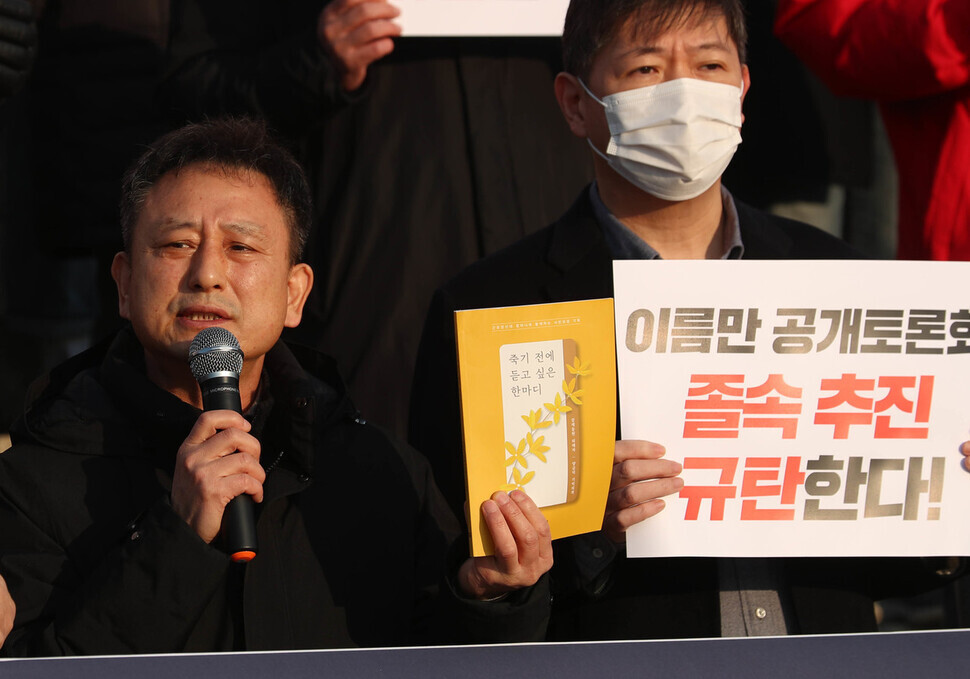hankyoreh
Links to other country sites 다른 나라 사이트 링크
[Editorial] Shortcut to good Japan-Korea relations mustn’t run over victims’ rights

The government has unveiled a proposal to pay compensation to victims of Japan’s wartime forced labor via the Foundation for Victims of Forced Mobilization by Imperial Japan through a concurrent assumption of debt. It is unclear whether the offending companies in Japan will apologize or take a part in the compensation.
If the government, in its haste to improve Korea-Japan relations, pushes ahead with a plan that erases the historical significance of the forced labor solution and offers no apologies or sincere condolences to victims, it will only face a headwind that will further worsen the relationship between the two countries.
This proposal was announced at a public debate held on Thursday by the Ministry of Foreign Affairs and Chung Jin-suk, president of the Korea-Japan Parliamentarians’ Union.
Seo Min-jung, director for Asian and Pacific affairs at the Ministry of Foreign Affairs, suggested that the Foundation for Victims of Forced Mobilization by Imperial Japan be the main source of compensation, saying that it would be possible for the victims to receive reimbursement for the judgment from a third party, not an offending Japanese company. This should be viewed as the administration’s official proposal.
Seo emphasized the “importance of faithfully maintaining and continuing the sincere apology and reflection already expressed by Japan.” In other words, don’t plan to receive a direct apology from the companies responsible and only statements that the Japanese government released in the past would be consulted to express their condolences.
When asked whether offending companies would participate in the compensation, Seo gave a simple response: “We will find an off-handed way to do so.” A proposal like this will not be able to persuade the victims or the public. The key demand of the victims is an official apology from offending companies.
Yang Geum-deok, a survivor of Japan’s forced labor mobilization, recently pleaded with Minister of Foreign Affairs Park Jin saying, “Please relay my words to President Yoon Suk-yeol: If all I wanted was money, I wouldn’t be doing this. Mistubishi should apologize and compensate.”
It is natural that the victims are criticizing the government’s proposal by claiming that it has “turned an issue concerning history and human rights into a matter of monetary payment.”
The government’s haste stems from its rush to strengthen military and diplomatic cooperation with Japan. After he received briefings from the Ministry of Foreign Affairs and Ministry of National Defense on Wednesday, the president said of Japan’s remilitarization, “Nobody would take issue with it.” The remark seems to advocate the Japanese government’s decision to increase defense spending and acquisition of enemy base strike capabilities.
Cooperation is key in situations where there are rapid changes in international order and worsening security situations but there are increasing concerns that turning a blind eye toward victims will result in an agreement akin to the 2015 Korea-Japan Comfort Women Agreement.
The government should, through diplomatic consultations, concentrate its efforts on creating a compromise that involves the apology of the Japanese companies and their participation in compensation.
The Japanese government should also play a role in ensuring that the offending companies fulfill their historical and moral responsibilities. The two governments should realize that cooperation between South Korea and Japan, as well as cooperation between South Korea, Japan and the US, will be difficult unless they solve this problem.
Please direct questions or comments to [english@hani.co.kr]

Editorial・opinion
![[Column] Has Korea, too, crossed the Rubicon on China? [Column] Has Korea, too, crossed the Rubicon on China?](https://flexible.img.hani.co.kr/flexible/normal/500/300/imgdb/original/2024/0419/9317135153409185.jpg) [Column] Has Korea, too, crossed the Rubicon on China?
[Column] Has Korea, too, crossed the Rubicon on China?![[Correspondent’s column] In Japan’s alliance with US, echoes of its past alliances with UK [Correspondent’s column] In Japan’s alliance with US, echoes of its past alliances with UK](https://flexible.img.hani.co.kr/flexible/normal/500/300/imgdb/original/2024/0419/2317135166563519.jpg) [Correspondent’s column] In Japan’s alliance with US, echoes of its past alliances with UK
[Correspondent’s column] In Japan’s alliance with US, echoes of its past alliances with UK- [Editorial] Does Yoon think the Korean public is wrong?
- [Editorial] As it bolsters its alliance with US, Japan must be accountable for past
- [Guest essay] Amending the Constitution is Yoon’s key to leaving office in public’s good graces
- [Editorial] 10 years on, lessons of Sewol tragedy must never be forgotten
- [Column] A death blow to Korea’s prosecutor politics
- [Correspondent’s column] The US and the end of Japanese pacifism
- [Guest essay] How Korea turned its trainee doctors into monsters
- [Guest essay] As someone who helped forge Seoul-Moscow ties, their status today troubles me
Most viewed articles
- 1[Column] The clock is ticking for Korea’s first lady
- 2Samsung barricades office as unionized workers strike for better conditions
- 3After 2 months of delayed, denied medical care, Koreans worry worst may be yet to come
- 4[Correspondent’s column] In Japan’s alliance with US, echoes of its past alliances with UK
- 5[Column] Has Korea, too, crossed the Rubicon on China?
- 6Hong Se-hwa, voice for tolerance whose memoir of exile touched a chord, dies at 76
- 7All eyes on Xiaomi after it pulls off EV that Apple couldn’t
- 8US overtakes China as Korea’s top export market, prompting trade sanction jitters
- 9[Photo] Smile ambassador, you’re on camera
- 10[Guest essay] How Korea turned its trainee doctors into monsters